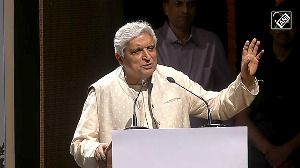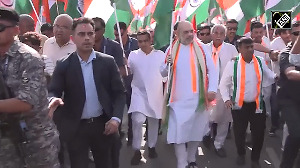Despite India, Pakistan and Turkmenistan signing an agreement for the Trans-Afghanistan pipeline, it faces many hurdles before it can become a reality, says Shebonti Ray Dadwal.
On May 23, GAIL India, Pakistan's Inter State Gas Systems and Turkmenistan's state gas company Turkmengaz signed the General Sales Purchase Agreements for the ambitious transcontinental gas pipeline project which would see Turkmen gas being delivered to India and Pakistan via Afghanistan in 2018.
Interestingly, Turkmenistan and Afghanistan signed only a MoU for cooperation in the gas sector, leaving the signing of a GSPA till negotiations on prices were agreed upon.
The 1,700-kilometre pipeline, once constructed, will transport some 90 billion cubic metres of gas per year for 30 years from Turkmenistan's giant Galkynysh field to energy-hungry consumers in Pakistan and India as well as relieving shortages in Afghanistan.
Despite the euphoria and the media coverage, one can't help but wonder whether the project will eventually see the light of day. No doubt, the fact that the project has received robust support from the US does allow for some optimism (the Baku-Tbilsi-Ceyhan pipeline was pushed through by Washington despite innumerable technical, commercial and security hurdles).
The US has done everything it could to ensure that the project becomes a reality, from getting the Asian Development Bank's technical and financial support and projecting it as a harbinger of regional peace and prosperity, to thwarting the rival Iran-Pakistan-India pipeline project.
Neither can one deny that when, and if, the pipeline is constructed, it will not only provide India with access to Central Asia's vast energy resources, but will also allow the latter to diversify their market away from Russian and Chinese dominance.
Nevertheless, there are several reasons to believe that the project remains a chimera. First, the pipeline will go through 735 km in Afghanistan (Herat and Kandahar) and Pakistan's Baluchistan (Quetta) which remain conflict-ridden, before going on to Multan and Fazilka in India.
After NATO exits post 2014, the instability in these regions may worsen, notwithstanding the Afghan government's assurance of an 'understanding' being reached with the Taliban.
Second, in 2008, the project cost was estimated at $7.6 billion (about Rs 41,800 crore). By the time the pipeline is laid, the cost is expected to be around $10 billion to $12 billion (about Rs 55,000 crores to Rs 66,000 crores).
Moreover, India will have to pay almost $13/mmBtu ($9.7/mmBtu to Turkmenistan, 50 cents/mmBtu to Afghanistan and Pakistan as transit fees and $1.83/mmBtu as transportation charges), which is lower than the $16/mmBtu paid for imported LNG, but far higher than domestically produced gas at $4.20/mmBtu.
Moreover, although ADB has helped in coordinating and facilitating the project's negotiation process over the past 10 years, it is funding only a small part of the project which has the onerous task of attracting commercial partners to build, finance and operate the pipeline, something that will be difficult given the unstable environment in which the pipeline will traverse.
Third, with India's share of the piped gas being 38 million cubic metres -- with Pakistan getting the same amount and Afghanistan getting 14 million cubic metres -- it will do little to satisfy demand that is projected to reach some 473 million cubic metres by 2017.
Fourth, while British auditors Gaffney, Cline and Associates, has ranked the Galkynysh field the world's second largest, with reserves pegged between 13.1-21.2 trillion cubic meters, doubts have been raised regarding Ashkabat's ability to ensure uninterrupted supplies for 30 years, given that Turkmenistan has committed gas supplies to Iran, Russia and China.
In fact, during Turkmen President Gurbanguli Berdymukhamedov's visit to Beijing in November 2011, it was agreed that Turkmenistan would double supplies up to 65 billion cubic meters of gas annually to China.
Similarly, doubts have been raised regarding Turkmenistan's ability to develop sufficient production, even if it does indeed have the requisite reserves, as well as develop its transport infrastructure, which is currently dependent on Russia's pipeline infrastructure.
Fifth, the role of China and Russia as potential spoilers is an issue that needs to be looked at. Russia's policy of using its pipeline network as an instrument to force recalcitrant neigbours to fall in line is well documented.
Moscow has often manipulated events to ensure that its former Soviet satellites do not succeed in gaining independent access to diverse markets. And with Gazprom having indicated its interest in being associated with the TAPI project, along with US firms ExxonMobil and Chevron, one cannot rule out Russian interference if Gazprom is not accommodated in the project.
At the same time, Beijing has made it clear that Central Asia is a key factor in its energy security policy and strategy, as it provides an alternative to its sea-based energy supplies. Like Russia, it may prefer the Central Asian countries to be dependent on its market. To ensure that it gets preference over other contenders, China has shown its readiness to pay premium prices for its energy supplies.
Given that pricing is a major factor in India's energy import decisions, Beijing may exploit it as a means of weaning away the Central Asian suppliers from its South Asian competitors.
Sixth, for a pipeline project to be successful, four key elements are crucial: 1. A strong sponsor; 2. Sufficient reserves; 3. Economic and commercial viability and 4. A secure market. While TAPI has a strong sponsor in the US, the other three components have raised some concerns.
While Turkmenistan's ability to ensure 30 years of supply is not assured, the project's commercial viability is also in doubt.
Given the security of the TAPI project route, which in turn would necessitate an escalation in costs, it would make it very difficult to find any financier or insurance underwriter to participate in the project, US political support notwithstanding.
Moreover, even if the pipeline becomes a reality, it is likely to be a high-value target for religious extremists in Pakistan, who will ensure that no energy supply enters India through their territory.
And finally, with India perceived as a critical pillar of the project in terms of its market size, the pricing of the gas would be critical.
Given the disparity in pricing between domestic and imported gas, this could become a spoiler in the future, particularly if the price of gas falls in the international market due to the availability of abundant unconventional or shale gas in the near future.
Shebonti Ray Dadwal is an energy security specialist and a Fellow at the Institute for Defence Studies and Analyses.







